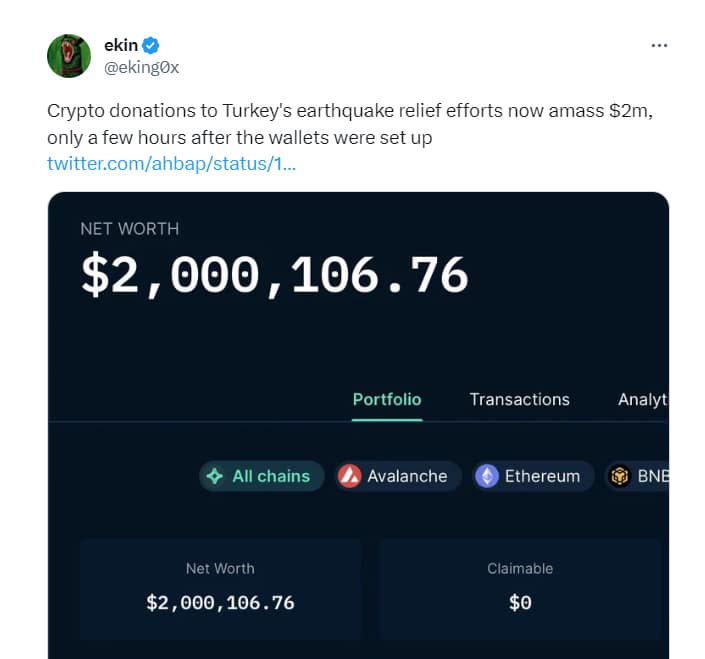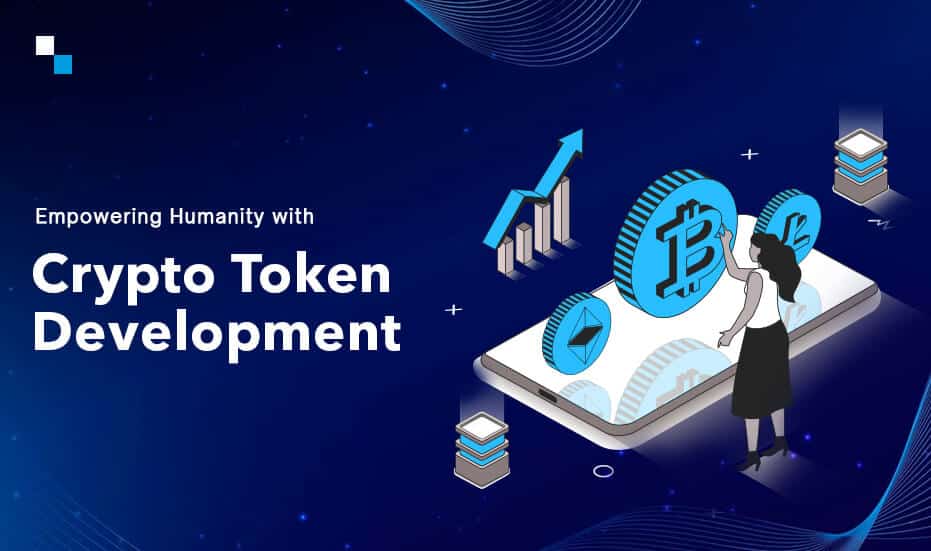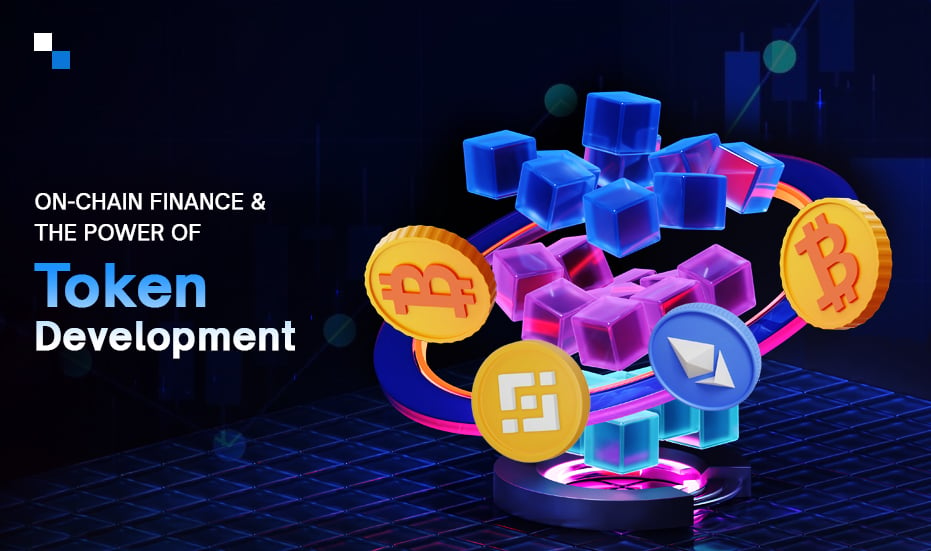In times of natural disasters and humanitarian crises, the world unites to provide support and relief to affected communities. However, the traditional channels for disaster relief and charitable contributions often face challenges related to transparency, inefficiency, and bureaucracy. In recent years, blockchain technology and cryptocurrency have emerged as potential game-changers in the field of humanitarian aid. A seasoned crypto development company, in particular, has the power to revolutionize disaster relief efforts, offering greater transparency, traceability, and direct access to funds for those in need.
It was not long ago when millions of dollars in cryptocurrency donations were poured into Turkey to aid the people who suffered due to devastating earthquakes.

Prior to this, when Ukraine needed humanitarian aid, it was done efficiently through crypto token development. According to Elliptic, a blockchain analytics business, approximately $212 million in cryptocurrency has been given to pro-Ukrainian war operations since the war began. This includes approximately $80 million in cryptocurrency going directly to the Ukrainian government.
In this article, we will explore the transformative potential of crypto tokens and blockchain for disaster relief and charitable contributions, highlighting the benefits, challenges, and real-world examples of these innovative solutions.
The Limitations of Traditional Disaster Relief and Charitable Contributions
Traditional disaster relief and charitable contributions have made significant strides in helping communities recover from natural calamities and humanitarian crises. However, several inherent challenges persist:
1. Lack of Transparency
Donors often lack visibility into how their contributions are utilized. Traditional systems may involve intermediaries, administrative costs, and delays, making it difficult to track how funds are disbursed.
2. Slow and Bureaucratic Processes
The distribution of funds through conventional banking systems can be time-consuming and subject to bureaucratic hurdles. This inefficiency can hinder the timely provision of aid to those in urgent need.
3. High Transaction Costs
International transactions and currency conversions can incur significant fees, reducing the overall impact of charitable donations.
4. Middlemen and Corruption
In some cases, intermediaries and corrupt practices may siphon off a portion of the donated funds, leaving less aid to reach the intended beneficiaries.
How Crypto Token Development Proves Beneficial for Disaster Relief and Charitable Contributions?
Choosing the right crypto development company can have numerous benefits for those willing to make disaster relief and charitable contributions. In fact, crypto token development revolutionizes the way aid is delivered and enhances the overall impact of humanitarian efforts.
Here are some key ways in which the development of crypto tokens proves beneficial in this context:
1. Transparency and Accountability
Blockchain technology, which underpins crypto tokens, provides an immutable and transparent ledger. Donors can track every step of the donation process, from the point of contribution to its utilization by aid organizations. This high level of transparency help build trust among donors, ensuring that their contributions are used as intended and promoting greater accountability in the management of relief operations.
2. Direct Peer-to-Peer Transactions
Crypto tokens enable direct peer-to-peer transactions without the need for intermediaries like banks or financial institutions. This allows aid to be swiftly and directly disbursed to affected communities, reducing delays and administrative costs. As a result, aid reaches those in need more efficiently and promptly, particularly in urgent and crisis situations.
3. Lower Transaction Costs
Traditional methods of transferring funds for disaster relief and charitable contributions often involve substantial fees for international transactions and currency conversions. Crypto tokens significantly reduce these costs, meaning more of the donated funds are available for aid purposes, maximizing the impact of charitable contributions.
4. Efficient Fund Allocation with Smart Contracts
Smart contracts are self-executing contracts with predefined conditions. Aid organizations can utilize smart contracts on blockchain networks to automate the release of funds based on specific triggers or milestones. This ensures that relief funds are efficiently allocated, and aid is promptly provided to beneficiaries, eliminating bureaucratic bottlenecks.
6. Greater Reach and Inclusivity
Crypto token development enables donors from any part of the world to contribute to disaster relief and charitable causes. With cryptocurrencies being borderless, people can donate without being restricted by geographical barriers. This broader reach increases the pool of potential donors, fostering a more inclusive and global response to humanitarian crises.
7. Micro-Donations and Fractional Giving
Crypto tokens allow for micro-donations, enabling even small contributions to make a significant impact when aggregated. Fractional giving through crypto tokens allows donors to support multiple causes simultaneously, amplifying their charitable reach.
8. Faster Response in Emergencies
During disasters, immediate aid is crucial. A crypto development company can facilitate the rapid mobilization of funds as soon as the need arises. It’s because blockchain transactions are processed faster compared to traditional banking systems, aid organizations can respond more swiftly to emergencies and provide timely assistance to affected communities.
9. Efficient Use of Funds
By reducing administrative costs and streamlining the aid distribution process, crypto token development ensures that a higher percentage of the donated funds directly benefit those in need. This efficiency translates into a more impactful and sustainable contribution to disaster relief and charitable initiatives.
9. Increased Donor Engagement
The transparency and traceability offered by crypto tokens can lead to greater donor engagement. Being able to witness the impact of their contributions in real-time motivates donors to continue supporting charitable causes and creates a sense of ownership in humanitarian efforts.
10. Global Collaboration and Crowdfunding
Crypto token development facilitates global collaboration among individuals, aid organizations, and non-profits. It enables crowdfunding campaigns that gather support from a diverse and widespread donor base, making it easier to reach fundraising goals for disaster relief and charitable missions.
Ready to create tokens for humanitarian aid?
Schedule Free DemoReal-World Examples of Crypto Token-Based Disaster Relief and Charitable Contributions
The growing popularity of crypto tokens has transformed the landscape of disaster relief and charitable contributions, introducing innovative solutions to longstanding challenges in the field of humanitarian aid. The transparency, efficiency, and direct peer-to-peer capabilities offered by crypto tokens are revolutionizing the way aid is delivered, enhancing accountability, and maximizing the impact of charitable contributions.
As the technology continues to evolve, crypto token development will continue to play a pivotal role in empowering humanity, providing hope, and driving positive change in times of crisis and need. Here are some real-world examples:
1. The United Nations World Food Programme (WFP)
The WFP, the world’s largest humanitarian agency fighting hunger, has been at the forefront of adopting blockchain technology for its aid programs. In 2017, the WFP launched the “Building Blocks” initiative in Jordan, providing food assistance to Syrian refugees. Refugees can redeem blockchain-based vouchers for their entitlements at local supermarkets, ensuring greater transparency and efficiency in the distribution process. The system reduced transaction costs and improved aid delivery to vulnerable populations.
2. The Red Cross and Red Crescent Movement
The Red Cross and Red Crescent Movement, a leading humanitarian organization, has been exploring crypto token development solutions for disaster relief efforts. In collaboration with blockchain platform Parity Technologies, the Red Cross launched the “Building Blocks” initiative in 2018. This initiative aims to use blockchain technology to improve cash transfer systems during emergencies, ensuring timely and secure aid for affected communities.
3. AidCoin
AidCoin is a blockchain platform that facilitates transparency and traceability for charitable donations. It allows donors to track their contributions and ensures that funds are utilized as intended. AidCoin also issues its own crypto token, which can be used to donate to vetted charitable organizations around the world.
4. GiveTrack
GiveTrack is a blockchain-based platform developed by the non-profit organization BitGive. It provides real-time tracking of charitable donations and enables donors to monitor the impact of their contributions. The platform utilizes crypto tokens to ensure transparency and efficiency in delivering aid.
5. Giveth
Giveth is a decentralized platform that empowers donors to support charitable causes directly. It utilizes crypto tokens and smart contracts to ensure transparent fund allocation and enables donors to see the impact of their contributions in real time.
6. The Binance Charity Foundation
The Binance Charity Foundation, the philanthropic arm of the Binance cryptocurrency exchange, uses blockchain technology to promote transparency and efficiency in charitable donations. It utilizes blockchain to track the flow of funds, ensuring that donations reach the intended beneficiaries and are used for their designated purposes.
Conclusion
Crypto token development for disaster relief and charitable contributions holds tremendous promise in transforming the way aid is delivered to those in need. Antier, a crypto development company with years of experience, is proficient in leveraging the power of blockchain technology and cryptocurrencies, which enhances transparency, efficiency, and accountability.
There are some real-world examples like AidCoin and GiveTrack that demonstrate how crypto tokens have been successfully used to provide transparent and direct aid to beneficiaries. As the technology continues to evolve, the potential for crypto tokens in disaster relief and charitable contributions to empower humanity becomes ever more apparent, offering hope for a more equitable and efficient humanitarian aid ecosystem.





